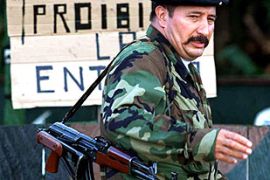Colombia alleges Farc-Correa link
Seized video appears to confirm rebels’ funding of Ecuador leader’s 2006 election campaign.

He also strongly denies receiving money from the rebel group, the Revolutionary Armed Forces of Colombia (Farc).
Ties between Colombia and neighbouring Ecuador are deeply frayed, and the video is sure to complicate relations further.
The video shows the second-ranking commander of Farc reading the deathbed manifesto of Manuel “Sureshot” Marulanda, the group’s founding leader.
Farc’s contributions
The manifesto states that Farc made contributions to Correa’s 2006 campaign, but it is possible that Correa was not aware of them.
The same manifesto turned up on a different Farc computer recovered in October.
But in the video it is read aloud by Jorge Briceno, a member of Farc’s ruling secretariat and No 2 commander, which will make it harder to deny.
| In depth |
|
|
Separated into 20 files on a Sony Vaio laptop, the video took more than a month to decrypt before the code was cracked on July 10, according to several government officials who spoke on condition they not be identified due to the matter’s sensitivity.
Colombia is outraged that Farc, which appears on the US state department’s “terror list”, was operating out of Ecuador, allegedly with the support of Correa’s government.
Ecuador broke diplomatic ties after Colombia crossed into its territory last year to raid the Farc camp.
Attempts by the Organisation of American States and the Carter Centre to mediate the dispute have been stymied.
Told of the video on Friday, Miguel Carvajal, Ecuador’s security minister, denied that Correa’s government had “any relation in the campaign or has any relation with or contributions from groups such as Farc, and certainly no type of accord”.
Correa himself has repeatedly denied any ties to Farc.
The US state department had no comment on the video.
Video decrypted
The video was found on a computer seized on May 30 in the Bogota home of a suspected Farc operative, and finally decrypted last week.
Hermes Ardila, a senior Colombian prosecutor and the country’s anti-terrorism unit chief, confirmed that the video was found on one of three computers seized in the arrest of Adela Perez, 36 – “the secretariat’s key player in Bogota”.
Perez is jailed on charges of terrorism and criminal conspiracy, as the alleged leader of an urban cell engaged in extortion and bombings in the capital, Ardila said.
The video shows Briceno reading from a laptop perched on a roughhewn shelf to about 250 sombre-looking fighters in a jungle clearing.
It appears unlikely that the video could be fake. AP video experts found no signs of tampering.
Also, Briceno is a known Farc leader with whom AP reporters had frequent contact from 1999-2002, and it is clearly him in the video.
Death manifesto
Briceno first informs the troops of Marulanda’s death and of changes in the Farc leadership.
He reads from a missive from someone present when Marulanda died on March 26, 2008, at age 78, of an apparent heart attack.
“We awake today with an immense solitude, so very sad. The comrade died yesterday, the 26th, at 18:20 hours,” Briceno reads.
The faces of his young audience are grim. They look dumbstruck, distressed.
At one point, Briceno pauses briefly and says: “What was that sound? A bomb?”
He gets a negative reply from off camera.
 |
| Correa, left and Colombian President Alvaro Uribe have sparred over the Farc issue [EPA] |
Briceno then turns to the sobering letter Marulanda wrote just days before his death.
The letter stresses the strategic importance of “maintaining good political relations, friendship and confidence with the governments of Venezuela and Ecuador”.
It is a grave reflection on devastating blows that Farc has suffered at the hands of the military in Colombia, which has received more than $4bn in US aid since 2000.
It describes the “trophies of war” Colombia obtained when it killed Farc foreign minister, Raul Reyes, and 24 other people in a March 1, 2008, raid on his jungle camp inside Ecuador.
Marulanda laments that Colombia seized a trove of electronic documents that badly compromised Farc and its foreign friends – namely, Correa and Venezuela’s President Hugo Chavez.
“The secrets of the Farc have been lost completely,” Briceno reads.
Among those secrets is “assistance in dollars to Correa’s campaign and subsequent conversations with his emissaries”, the letter said.
It mentions “some agreements, according to documents in the possession of all of us, that are very compromising regarding our ties with friends”.
Ecuador’s reaction
Carvajal, the Ecuadorean minister, told AP that if the video is proven to be authentic, his government will want to know who the supposed emissaries are that established ties with the Farc “in the name of the (Correa) electoral campaign”.
Fander Falconi, the country’s foreign minister, announced late on Friday the formation of a commission to investigate the allegations.
Marulanda’s letter does not say whether Correa personally knew of the money, and does not mention an amount.
But it supports four other documents the Colombian government says it found on Reyes’ laptop that were allegedly written in late 2006 by Farc leaders discussing payments of at least $100,000 to Correa’s campaign.
Correa has argued that Reyes’ computer equipment could never have survived the bombs that destroyed his jungle camp.
Despite revelations about ties to Farc, Correa was re-elected in April by a comfortable margin.

